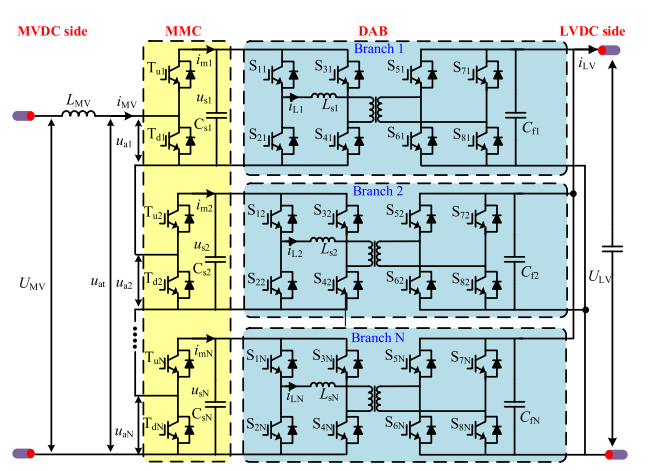Bidirectional Power Control Strategy for Super Capacitor Energy Storage System Based on MMC DC-DC Converter
Also Available Domains Power Quality
Objective
The main objective of this project is to employ a bidirectional power control strategy for Super Capacitor Energy Storage System Based on MMC DC-DC Converter.
Abstract
This paper focuses on a super capacitor energy storage system based on a cascaded DC-DC converter composed of modular multilevel converter (MMC) and dual active bridges (DAB). The cascaded converter is called MMC-DAB for short. This paper analyzes the topology and modulation strategy of the system in detail. Taking into account the shortcomings of the traditional bidirectional power control strategy, this paper proposes a control strategy where the DAB module of each branch independently controls the voltage of the sub-module capacitor. The mathematical models of the traditional and the proposed control strategy are established. The stability of the two control strategies is analyzed and compared. Finally, a MW-level engineering prototype of the MMC-DAB energy storage system is designed. The performance of the proposed topology is validated through the MATLAB-based simulations.
Keywords: Vessel integrated power system, super capacitor energy storage system, bidirectional power control, sub-module capacitor voltage control
NOTE: Without the concern of our team, please don't submit to the college. This Abstract varies based on student requirements.
Block Diagram

Specifications
Software Configuration:
Operating System : Windows 7/8/10
Application Software : Matlab/Simulink
Hardware Configuration:
RAM : 8 GB
Processor : I3 / I5(Mostly prefer)
Learning Outcomes
- Introduction to Matlab/Simulink
- What is EISPACK & LINPACK
- How to start with MATLAB
- About Matlab language
- About tools & libraries
- Application of Matlab/Simulink
- About Matlab desktop
- Features of Matlab/Simulink
- Basics on Matlab/Simulink
- Introduction to controllers.
- Study of PWM techniques.
- Project Development Skills:
- Problem analyzing skills
- Problem solving skills
- Creativity and imaginary skills
- Programming skills
- Deployment
- Testing skills
- Debugging skills
- Project presentation skills
- Thesis writing skills


 Paper Publishing
Paper Publishing
